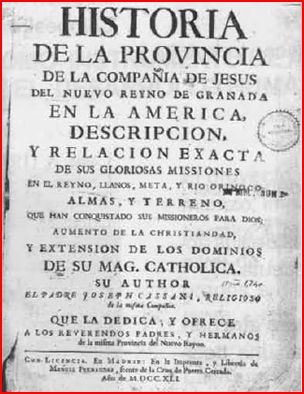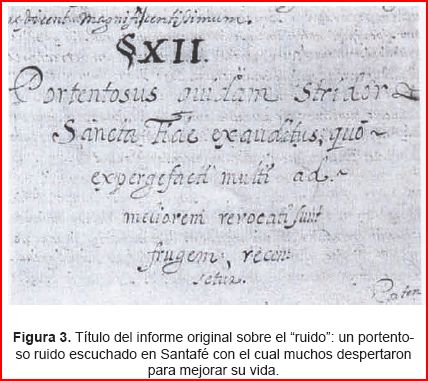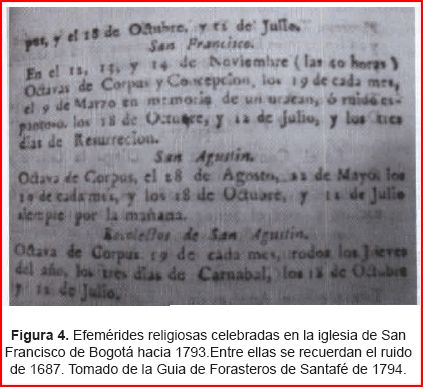It looks like you're using an Ad Blocker.
Please white-list or disable AboveTopSecret.com in your ad-blocking tool.
Thank you.
Some features of ATS will be disabled while you continue to use an ad-blocker.
17
share:
Most of us are familiar with the "rumbling noise" reports coming from different places lately, a phenomena still not entirely explained. Some of the
theories envlove a sort of technology, volcano/seismic activity and meteorites.

Well, this is an event occurred in the night of March 9 of 1687, in Bogota, Colombia. That means we can cancel technology and HAARP-type weapons, unless we want to consider alien technology of course.



Also, seems that records/reports of volcanic ashes/clouds haven't been found, so volcano activity is not an strong theory neither, but at the end of the same year a big earthquake happened in Peru.
As I read the sources, I coudn't see any report of "lights or shining sky", to make me believe this was a meteorite, but I need to mention the sulfuric smell reported.
Imagine how those colombians in 1687 felt, also the president thought they were invaded and sent troops to the area.
es.wikipedia.org...
www.accefyn.org.co...
www.revistaelastrolabio.com...
historico.unperiodico.unal.edu.co...
astrolabio.phipages.com...(84-90).pdf

Well, this is an event occurred in the night of March 9 of 1687, in Bogota, Colombia. That means we can cancel technology and HAARP-type weapons, unless we want to consider alien technology of course.



Also, seems that records/reports of volcanic ashes/clouds haven't been found, so volcano activity is not an strong theory neither, but at the end of the same year a big earthquake happened in Peru.
Cassanl (1741) relates to what happened in Santa Fe with the large earthquake in Peru in December
1687, taking an explanation suggested by Ribero.
As I read the sources, I coudn't see any report of "lights or shining sky", to make me believe this was a meteorite, but I need to mention the sulfuric smell reported.
The astronomical hypothesis was proposed by Moreno & Portilla (2006), based on comparison with other
similar phenomena reported in the literature (Lewis, 1996) and the analysis made by Cassani (1741) and Ramirez (1975), who argue that noise originated in the atmosphere. It sets that on the night of March 9, 1687 a small comet or asteroid (meteoroid) entered the atmosphere.
Time of Noise is the name given to the phenomenon occurred at 10:00 pm on March 9, 1687 in the then city of Bogotá and its surroundings, according to the report made by Peter S. Market J. and transcribed by the Jesuit Juan Ribero (1728) and Joseph Cassani (1741), and oral tradition in Bogotá. Noise is characterized by unusually strong mysterious and unknown origin accompanied by a strong smell of sulfur, which lasted for several days, lasting approximately 30 minutes, generating collective panic among the inhabitants of the city.
For non-registration did not cause it appears that earthquake, fire, flood, landslide, storm, no injuries or deaths occurred. An interesting detail: during its duration is perceived a strong smell of sulfur.
Imagine how those colombians in 1687 felt, also the president thought they were invaded and sent troops to the area.
At about 22:00 when most of the inhabitants of the city slept, he heard a deafening noise that lasted for 20-30 minutes, accompanied by smells of sulfur. Immediately, the colonial city residents panicked and fled their homes sleeping clothes in the streets uncovered. Most took refuge in the religious cloisters where they remained several days praying and fasting fearing the arrival of a legion of demons or of Judgement. President Gil Cabrera colonial Davalos led a military expedition to the outskirts of the city, where he apparently felt more strongly the strange phenomenon. The deafening noise ended that night and never ran again, while the sulfur stench remained for some days on the Sabana de Bogotá. For many years after the date March 9 is uncovering the sacraments and taken as a religious festival in Bogota. The expression "Time of Noise" was forged in the jargon of the inhabitants of New Granada.
es.wikipedia.org...
www.accefyn.org.co...
www.revistaelastrolabio.com...
historico.unperiodico.unal.edu.co...
astrolabio.phipages.com...(84-90).pdf
reply to post by Trueman
That's exactly why I think it is something "natural", as in atmospheric. It's also the only way to explain the fact that it is heard in so many places around the world. If it were a volcano, or machinery etc, it would only be heard in one particular area. Perhaps the reason it is being reported more frequently now, is actually NOT that it is HEARD more frequently at all.....but because there is now a way for people to report, and share it via the internet....whereas before, only the people in the immediate area of the event would know about it. Or....maybe because of Earth changes (such as changes in the ozone layer) make it more audible somehow.
That's exactly why I think it is something "natural", as in atmospheric. It's also the only way to explain the fact that it is heard in so many places around the world. If it were a volcano, or machinery etc, it would only be heard in one particular area. Perhaps the reason it is being reported more frequently now, is actually NOT that it is HEARD more frequently at all.....but because there is now a way for people to report, and share it via the internet....whereas before, only the people in the immediate area of the event would know about it. Or....maybe because of Earth changes (such as changes in the ozone layer) make it more audible somehow.
But how can a meteorite explain the length of the noise? Even this article says the noise lasted 30min. It would seem that is a very long time for
any body to enter the amosphere, no?
reply to post by StealthyKat
Right, we have to give all the credit to Mother Nature for this one too. The only thing is we don't know how she does it.
Right, we have to give all the credit to Mother Nature for this one too. The only thing is we don't know how she does it.
reply to post by jtma508
That's why the meteorite theory didn't convinced me 100%. Good observation.
That's why the meteorite theory didn't convinced me 100%. Good observation.
I think we can guess volcanic activity might be responsible and have a chance of being right. Check out this map:
Originally posted by Trueman
reply to post by StealthyKat
Right, we have to give all the credit to Mother Nature for this one too. The only thing is we don't know how she does it.
vulcan.wr.usgs.gov...
All those are wthin an "earshot" of Bogota, if you consider that the Krakatoa eruption could be heard nearly 3,000 miles (4,800 km) from its point of origin (though it was the loudest volcanic sound known in history).
So obviously the volcanic sound doesn't have to be anywhere near as loud as Krakatoa to travel those much shorter distances from those volcanoes to Bogota. Can you imagine being 2500 miles away from Krakatoa and hearing the eruption? The distance from LA to New York City is 2462 miles. If the loudest one is that loud, even the less loud eruptions can be heard some distance away.
Also, the smell of sulfur sounds consistent with something along the lines of volcanic activity, though the sulfur content varies by volcano.
edit on 16-12-2011 by Arbitrageur because: clarification
reply to post by Arbitrageur
Well, according to the info provided, there were no reports of ashes covering the area and no seismic activity neither. Just the rumbling.
Well, according to the info provided, there were no reports of ashes covering the area and no seismic activity neither. Just the rumbling.
reply to post by Trueman
No seismic activity? As if they had seismic sensors set up around the volcanoes in 1687?
And you are correct in thinking that some volcanic eruptions are accompanied by huge ash clouds. However you are incorrect if you think all of them spew ash; for example, I don't see any ashes from this eruption in Hawaii:
www.flowersplane.com...
I think you are making false assumptions about volcanoes if you rule out volcanic activity.
No seismic activity? As if they had seismic sensors set up around the volcanoes in 1687?
And you are correct in thinking that some volcanic eruptions are accompanied by huge ash clouds. However you are incorrect if you think all of them spew ash; for example, I don't see any ashes from this eruption in Hawaii:
www.flowersplane.com...
I think you are making false assumptions about volcanoes if you rule out volcanic activity.
Originally posted by Arbitrageur
I think you are making false assumptions about volcanoes if you rule out volcanic activity.
Along the same lines, how many people have reported smelling sulfur in the air when they report a rumbling? It would be very easy to detect a pattern like that. If people heard a very strange noise and smelled something unusual at the same time, they would say so. It wouldn't make sense to not mention something else strange that happened at the same time.
I'm not sure what "rumbling noise" is being referred to anyway. But, regardless, we are living in a new world today, and any comparison between today and many years ago would not be factoring in the new technology we have. Who knows what is causing today's noise? If it were due to something unknown to the public, only those people intimately involved with the use or development of such technology would know. The rest of us are in the dark.
reply to post by daynight42
That's a good point. I think that today we also have a lot of manmade technology that could make some strange noises that people might not understand at a distance.
But I certainly wouldn't rule out other natural causes. The other thread about the strange noises mentioned a sand dune as one source of some noises. That was pretty unexpected to me, and there are probably other surprises out there we haven't figured out yet.
That's a good point. I think that today we also have a lot of manmade technology that could make some strange noises that people might not understand at a distance.
But I certainly wouldn't rule out other natural causes. The other thread about the strange noises mentioned a sand dune as one source of some noises. That was pretty unexpected to me, and there are probably other surprises out there we haven't figured out yet.
Originally posted by Arbitrageur
reply to post by Trueman
I think you are making false assumptions about volcanoes if you rule out volcanic activity.
Well, think again and harder because I don't. The evidence had been analyzed by many experts and EVERYBODY concluded volcanic activity is NOT confirmed on that night. A volcano eruption would be the easiest event to be reported for those days. In this case, volcanic activity is just a theory.
About the sulfuric smell, it doesn't need to be related to a volcano. As the info provided shows, this kind of smell also can be provoked by a meteorite burning. I am not saying It was neither.
Sorry brother if you felt unconfortable with my reply, as it looks.
edit on 17-12-2011 by Trueman because: (no reason given)
reply to post by daynight42
The rumbling noise in discussion has many threads here, just type "rumbling noise' on the search engine. Obviously, some claims might need to be discarded, but not all.
Thanks for your post.
The rumbling noise in discussion has many threads here, just type "rumbling noise' on the search engine. Obviously, some claims might need to be discarded, but not all.
Thanks for your post.
This is such a frustrating topic for obvious reasons. People not only have different sensitivities to sound but use many different words to describe
them. One mans rumble is anothers hum. Yep this is an old phenomena that is very interesting to me. However the phenomena is unexplained sound or
sourceless sounds and in each case whether it be the Taos Hum or the Kokomo hum or the Bristol Hum or the Barisal Guns there is no reason each cannot
have a separate source. They may be similiar but so is the sound of a distant train and a distant large truck, and they are two clearly separate
things....check my thread out here for my little story and theories.... www.abovetopsecret.com...
reply to post by nitro67
Great info there, will read it carefully before further comments, but thanks for thinking out of the box.
Great info there, will read it carefully before further comments, but thanks for thinking out of the box.
new topics
-
Bobiverse
Fantasy & Science Fiction: 1 hours ago -
Florida man's trip overseas ends in shock over $143,000 T-Mobile phone bill
Social Issues and Civil Unrest: 1 hours ago -
Former Labour minister Frank Field dies aged 81
People: 3 hours ago -
SETI chief says US has no evidence for alien technology. 'And we never have'
Aliens and UFOs: 5 hours ago -
This is our Story
General Entertainment: 7 hours ago -
President BIDEN Vows to Make Americans Pay More Federal Taxes in 2025 - Political Suicide.
2024 Elections: 10 hours ago -
Ode to Artemis
General Chit Chat: 10 hours ago
top topics
-
President BIDEN Vows to Make Americans Pay More Federal Taxes in 2025 - Political Suicide.
2024 Elections: 10 hours ago, 14 flags -
Should Biden Replace Harris With AOC On the 2024 Democrat Ticket?
2024 Elections: 16 hours ago, 6 flags -
One Flame Throwing Robot Dog for Christmas Please!
Weaponry: 14 hours ago, 6 flags -
Don't take advantage of people just because it seems easy it will backfire
Rant: 14 hours ago, 4 flags -
Ditching physical money
History: 14 hours ago, 4 flags -
SETI chief says US has no evidence for alien technology. 'And we never have'
Aliens and UFOs: 5 hours ago, 4 flags -
Ode to Artemis
General Chit Chat: 10 hours ago, 3 flags -
Former Labour minister Frank Field dies aged 81
People: 3 hours ago, 3 flags -
VirginOfGrand says hello
Introductions: 15 hours ago, 2 flags -
This is our Story
General Entertainment: 7 hours ago, 2 flags
active topics
-
Police clash with St George’s Day protesters at central London rally
Social Issues and Civil Unrest • 43 • : SprocketUK -
Mood Music Part VI
Music • 3097 • : TheWoker -
President BIDEN Vows to Make Americans Pay More Federal Taxes in 2025 - Political Suicide.
2024 Elections • 42 • : network dude -
Post A Funny (T&C Friendly) Pic Part IV: The LOL awakens!
General Chit Chat • 7132 • : watchitburn -
So this is what Hamas considers 'freedom fighting' ...
War On Terrorism • 254 • : TheWoker -
"We're All Hamas" Heard at Columbia University Protests
Social Issues and Civil Unrest • 271 • : TzarChasm -
University student disciplined after saying veganism is wrong and gender fluidity is stupid
Education and Media • 45 • : TzarChasm -
Florida man's trip overseas ends in shock over $143,000 T-Mobile phone bill
Social Issues and Civil Unrest • 1 • : budzprime69 -
Don't take advantage of people just because it seems easy it will backfire
Rant • 7 • : confuzedcitizen -
Russia Ukraine Update Thread - part 3
World War Three • 5725 • : BernnieJGato
17


